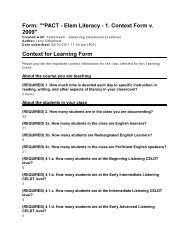The Tutoring Book - California State University, Sacramento
The Tutoring Book - California State University, Sacramento
The Tutoring Book - California State University, Sacramento
Create successful ePaper yourself
Turn your PDF publications into a flip-book with our unique Google optimized e-Paper software.
work with students who seem to speak a certain level of English whereas their writing shows a very<br />
different level of English.<br />
How the Proficiency of L1 Affects L2<br />
(by Rexford Osei-Ansah)<br />
<strong>Tutoring</strong> in the Writing Center can be more effective and productive in providing assistance to<br />
students if the educational, cultural and socio-linguistic background, and more importantly the L1 of the<br />
students are made available. Every individual begins to talk from infancy before learning to speak other<br />
languages. This language of infancy is the first language (L1). <strong>The</strong> second language (L2) is the language a<br />
person learns after the first language (L1). Human beings are born with the ability to learn and form<br />
associations so a child acquires language form by imitating what he hears the parents speak. Adult L2<br />
learners who learn a second language begin from scratch and in the learning process, they find different<br />
ways to facilitate the mastery of the language. An example is repetition which is similar to a child’s first<br />
language learning process.<br />
I am writing this article based upon what I observed from an analysis of a Russian-speaking ESL<br />
student’s writing as a requirement for one of my TESOL classes and from my personal experience as an<br />
ESL student so many years ago. In the course of the analysis, I noticed that some error patterns which I<br />
found to be the result of transfer from L1 which is the Russian language. This student had difficulties with<br />
the use of certain elements of the English language that are not in the Russian language. I would like to<br />
point out that Russian is a case language whereas English is SVO (it follows the “Subject Verb Object”<br />
order of arrangement). For example, “Peter kicks the ball.” Peter is the subject, the verb is kick, the action<br />
performed by Peter, and the ball is the object that received the action.<br />
By analyzing the errors, I found out that errors occur often due to the difference between L1 and<br />
L2. For example in Russian, the definite and indefinite articles “the” and “a” do not exist. In a sentence<br />
like “Peter is a boy”, the student wrote “Peter boy”. By writing “Peter boy” the student is transferring<br />
directly from Russian because they are not familiar with the use of the definite and indefinite articles.<br />
Certain errors were made in the use of auxiliary verbs as well. I noticed structures in which the student<br />
wrote “that why” “he the boy that came to the school”, “I been” etc. Another one of the characteristics of<br />
the Russian language is that the auxiliary verbs “to be” and “to have” don’t exist. For this reason, the<br />
student deleted “is” from the sentence -another example of transfer interference.<br />
When I lived in Ghana, Twi, one of the Akan languages, was used together with English from<br />
first grade through the eighth grade. Because of its limited use in the classroom, there was limited<br />
opportunity for students to practice the use of English language through direct interaction with people. I<br />
came to United <strong>State</strong>s as an international student only to realize how handicapped I was in the use of the<br />
English language. I could write well, but in the middle of conversation I got lost when others spoke fast. I<br />
was classified as “biliterate” because I already had a basic education in my L2 but I had many<br />
deficiencies as far as grammar, structure and organization were concerned. I had a hard time adapting to<br />
writing styles in America. Even though I thought I had considerable words in my English lexicon, some<br />
of them were spelled differently. For example in America, words like “defence” and “labour” are spelled<br />
”defense” and “labor” respectively. Also, I found out that in high rise buildings, people use an “elevator”<br />
but not a “lift” to move from one floor to the other. Words like “lorry” and “articulated truck” have been<br />
replaced by “truck” and “eighteen-wheeler truck”. <strong>The</strong> transfer from the Twi language (L1) into English<br />
language (L2) contributed to most of the linguistic differences.<br />
Ear Learners vs. Eye Learners<br />
(by Jamie Ferrando)<br />
97

















